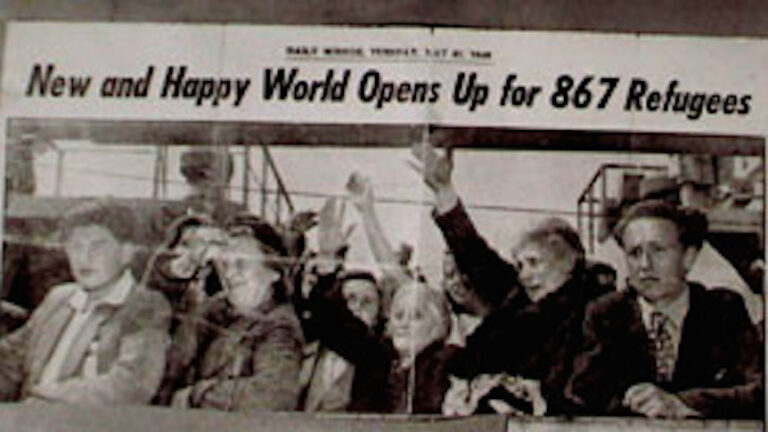Leslie WhatPortland, OR, United States

Here’s a newspaper clipping with my father, not yet off the boat. He’s the worried young man with the kinky black hair on the right of the photo. He had left his country illegally, and somehow, alone and without resources—including the ability to speak or understand the language of his new home—managed to talk his way into America. His life in Kiev was one of deprivation, and though he seldom spoke of his painful past, we knew he had experienced starvation, poverty, and prejudice from childhood on. As a young teen, he had left his mother behind when he was conscripted into Stalin’s army. His life as a soldier was like one long, dark, cold winter, filled with terror and bullying as the troops marched west, through Poland, and ultimately, into a vanquished Berlin.
My father was so afraid of how the Communists would punish his mother once it became known he had deserted the Red Army and found asylum in the U.S. that he never tried to contact her. His experience as a Jew in a Jew-hating continent had taught him never to rely on others, to trust no one but himself. Though I have one picture of my grandmother, taken in the 1920s, (and the only physical thing he carried out from the land of his birth), I don’t know enough about her to begin to search, despite search engines and genealogical databases. I’ve often wondered if we might have cousins living in Kiev or elsewhere, though I doubt, because of my upbringing, that I could trust anyone who said we were related.
We were not raised with a religious education beyond the admonition never to tell anyone we were Jewish. My mother, a German Holocaust survivor with a diaspora story worthy of her own page, was not from a religious family and my father was actively anti-religious. But something happened to my father during the Six-Day War in 1967. He followed the news and went to rallies and gave support to the State of Israel and the Jewish claim for a homeland. Prior to 1967, I had never seen him passionate about politics or Jewish culture or honestly, anything outside of himself. I don’t know if my father had always been ashamed of being Jewish, but I know that after the Six-Day-War, he discovered his Jewish pride.
